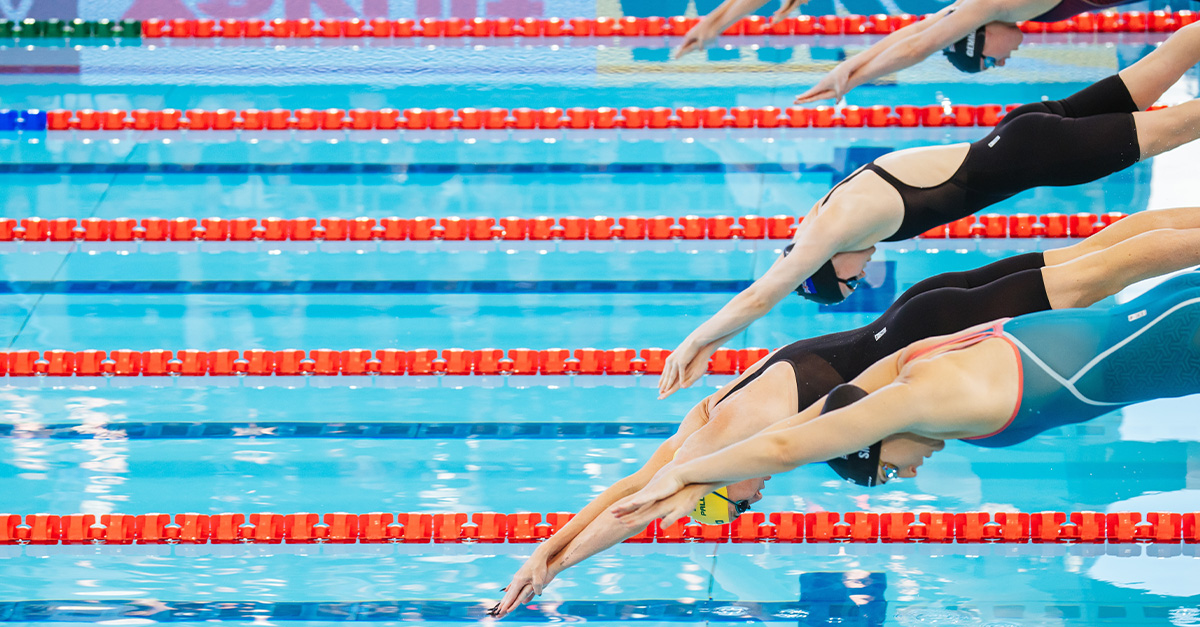


Get a free copy of Parental Rights & Education when you subscribe to our newsletter!

The plaintiffs argue that by allowing men to compete in women’s competition and share women’s locker rooms, the NCAA is breaking federal and state law and perpetrating “foreseeable and avoidable harms, damages, and losses” to women
Riley Gaines and 15 other women, all current or former collegiate athletes, have filed suit against the National Collegiate Athletic Association (NCAA) over its policies allowing males to compete against females.
The Independent Council on Women’s Sports (ICONS) is funding the suit, which was filed in the Northern District of Georgia and also names the University System of Georgia, Georgia Tech University, and University of North Georgia as plaintiffs. Georgia Tech hosted the 2022 NCAA Swimming Championships in which William Thomas (better known as Lia Thomas) was permitted to compete and use the women’s locker room.
Thomas’s inclusion in women’s swimming has been the most well-known example of males who identify as female competing against women.
His presence at the national championships featured heavily in the suit.
Riley Gaines, the former University of Kentucky swimmer who tied with Thomas in one of the races at the championships, is a plaintiff in the suit. Gaines was denied a trophy at the time in lieu of Thomas and she has since become the most outspoken critic of males competing in women’s sports.
The suit claims that the NCAA’s inclusion of Thomas violated women’s Title IX right to equal opportunity and their Fourteenth Amendment right to bodily privacy.
The suit states:
“[The] NCAA…imposed a radical anti-woman agenda on college sports, reinterpreting Title IX to define women as a testosterone level, permitting men to compete on women’s teams, and destroying female safe spaces in women’s locker rooms by authorizing naked men possessing full male genitalia to disrobe in front of non-consenting college women and creating situations in which unwilling female college athletes unwittingly or reluctantly expose their naked or partially clad bodies to males, subjecting women to a loss of their constitutional right to bodily privacy.”
Indeed, several of the plaintiffs recounted their discomfort at having to share a locker room with Thomas, some opting to change in broom closets or bathroom stalls rather than have to change in front of him.
Kylee Alons, a plaintiff who swam for North Carolina State University, recalls that she changed in a dimly lit utility closet she found under the bleachers. “I was literally racing U.S. and Olympic gold medalists and I was changing in a storage closet at this elite-level meet. I just felt that my privacy and safety were being violated in the locker room.”
Kaitlyn Wheeler said she didn’t know Thomas would be changing in the locker room until she was changing into her suit and Thomas walked by her. The lawsuit claims that the suits are so tight they take 15-20 minutes to put on. “While you’re doing this, you’re exposed. You can’t stand there and hold a towel around you while putting the suit on at the same time,” Wheeler explained. She said when Thomas walked by, she was exposed from the waist up. “Never in my 18-year career had I seen a man changing in the locker rooms. I immediately felt the need to cover myself. I could feel the discomfort of the other girls in there.”
One swimmer who remains anonymous in the suit said that she changed in a bathroom stall because she “was shocked to see a naked Thomas 10 feet in front of her and a full frontal view of Thomas’s genitalia” when she entered the locker room.
The suit also claims that the NCAA’s policies, which allows males to compete against women once their testosterone level dips below a certain level depending on the sport, does not mitigate the biological advantage males have over females. The suit also alleges that the NCAA allows males to compete against females while maintaining a far higher testosterone level than a woman could have unless they take illegal performance-enhancing drugs.
The suit says that in 19 of 25 NCAA sports, the testosterone threshold a male must meet to compete against women is five times higher than what any woman produces without doping.
Cited are numerous studies and facts regarding human biology that show males have a far greater advantage than just their testosterone levels, including more muscle and skeletal mass; greater lung capacity; longer average limb length; and higher levels of circulating hemoglobin, which facilitates oxygen transport in red blood cells.
Serving as the lead attorney is William Bock III, who recently made headlines when he resigned from the NCAA Committee on Infractions due to the NCAA’s transgender policy, calling it “institutionalized discrimination” leading to “sanctioned cheating.”
Bock was the general counsel of the U.S. Anti-Doping Agency from 2007-2020.
The plaintiffs saw the need to take the fight to the NCAA, according to Gaines and ICONS.
Gaines explained in an interview on Outkick The Morning,
“It was time someone took action. I thought to myself for so long, ‘I wish someone would sue.’ That’s how we win, someone has to sue — never once occurring to me that I could be a part of this, I could really help spearhead this along with ICONS and 15 other athletes that signed onto this lawsuit.”
She added in a press release for ICONs: “We’re not just fighting for ourselves, we’re fighting for every young girl who dreams of competing in sports. I’m thankful for ICONS’ commitment to our cause, especially their financial commitment allowing us to take this to court. I urge anyone who cares about protecting women’s sport to help get behind us.”
Kim Jones, co-founder of ICONS, explained,
“By challenging the NCAA’s draconian and discriminatory policies, we’re sending a clear message: the integrity of women’s sports is non-negotiable. We are committed to defending the hard-won rights of women athletes everywhere. This isn’t just a legal battle; it’s a moral stand for equality and justice in sports.”

Imagine you are one of these women on the day of the 2022 NCAA Swimming Championships. You have dreamed of and trained for this day for most of your life. You have spent countless hours in the pool, doing strength training, meticulously watching your diet, spending long hours on bus rides, working on your form, and juggling the many demands of being a student-athlete.
You arrive in Atlanta ready to compete against the best women swimmers in the country. Perhaps you feel confident, or maybe you feel butterflies in your stomach. Your palms are sweating and the last thing you want to encounter is any additional stress. You walk into the locker room to change and before you stands a naked man, towering above you, who is somehow allowed to expose himself to you and watch as you disrobe.
Your stress levels rise as you run to hide in the bathroom stall. You feel mortified that you just saw a man changing and feel almost as if you did something wrong. As you uncomfortably attempt to contort your body to put on a skin-tight suit inside of a bathroom stall, all the confidence, all the excitement, and all the hope you felt going into this day is gone. Your heart sinks as you realize you have no hope of winning. All your talent, hard work, and sacrifices can’t overcome the biological advantage that a man has over you.
Then it slowly dawns on you that that the governing body of your sport, the one that is supposed to promote equality and fairness, isn’t coming to your rescue. In fact, they are the ones who gave permission for this man to watch you change and steal your championship. And he’ll do just that, winning his best event, the 500-yard freestyle, by nearly 2 seconds over the runner-up. Of course, you’re expected to be gracious, laud the winner, and act like you don’t notice when the sport’s leaders and the media constantly refer to him as a “she” and a “her.”
We paint this picture to help you understand and empathize with how these women felt — even if most of them were too bullied and too scared at the time to come out and say it. Of course, if that day in Atlanta had been just a one-off experience, maybe it could be forgiven and eventually forgotten. But the same injustice is happening with increasing frequency, almost weekly now, where high school, college, and professional women are expected to avert their eyes and pretend that the undressed man in their locker room isn’t really a man and that the male athlete shamelessly grinning from the top of the podium somehow won fair and square. And those who say anything, or even roll their eyes in frustration, are berated and shamed for being transphobic and “poor sports.”
It needs to stop, and hopefully this lawsuit will help make that happen. Unfortunately, it will be an uphill climb as many judges in this country seem to be just as propagandized, possibly even as intimidated, by the LGBT lobby as are officials with sport governing bodies, which may be why high school athletes in Connecticut initially lost a similar lawsuit at both the district and the appellate court levels and why a West Virginia law banning boys and men from girls’ and womens’ competitions was put on hold by three different courts, among them the Supreme Court.
What could make a difference with this latest court challenge brought by Gaines and others is that it is being led by William Bock, who not only has a unique insight into the inner thinking and culture of the NCAA on the question of transgender athletes in women’s sports but who, for nearly 15 years, investigated and prosecuted many of the biggest cheating scandals in international sports, including that of Lance Armstrong.
If anyone can help judges understand why letting male athletes compete in women’s sports is unfair, a violation of Title IX, and a form of cheating and discrimination, it’s Bock. We should all pray that the judges will listen carefully to the evidence presented, put themselves in the place of these brave women, and take a stand for fairness, safety, and common sense.
If you like this article and other content that helps you apply a biblical worldview to today’s politics and culture, consider making a small donation here.

Notifications